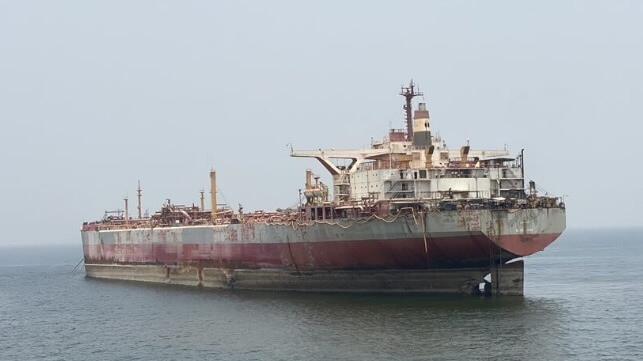UN Pauses Incomplete Salvage Mission for Decaying FSO Safer off Yemen

The project to decommission the decaying oil tanker turned storage unit off Yemen fell from public attention after the UN reported last August that it had completed the oil transfer. In a new interview with Agence France-Presse (AFP) UN officials are however again raising concerns reporting that completing the project is being endangered by delays, financial shortfalls, and now the security situation in the Red Sea.
The FSO Safer (400,000 dwt) was built in 1976 as a supertanker operating as the Esso Japan before being converted into an unpropelled storage vessel in 1987. Named Safer she was positioned about four miles off the coast of Yemen operating for the national oil company with a capacity of about three million barrels. When operations were suspended, she had approximately one million barrels of oil aboard, and she fell into disrepair due to limited maintenance since 2015.
"After much consideration, the UN had no option but to pause the project at this time,” a spokesperson for the UN Development Programme which oversaw the salvage operation recently told AFP. They said they are closely monitoring the situation in Yemen but cited security concerns along with a $22 million shortfall in funding.
The project remains in a precarious situation. UN officials in the years-long lead-up to getting the salvage operation underway frequently raised concerns that the Safer could get caught in the conflict, be sabotaged, or hit by a stray missile. With the renewed attacks from the Houthi and the U.S.-led response and security operation, fears are again being raised that either the Safer or the replacement tanker, the Yemen (300,000 dwt), could become either a target or an accidental victim of the fighting in the region.
The original UN plan called for a second phase after the transfer of the oil between the two vessels. The team led by Boskalis’ SMIT Salvage completed the final activities at the end of August 2023, which included the cleaning of the tanks of the Safer in preparation for its removal and sale for scrap. UN officials however caution that the structure of the tanker remains in critical condition and there are residual amounts of oil that could still leak from the vessel. The current pause in the operation affects the effort to remove and recycle the vessel.
The salvage team assisted with the mooring of the Yemen at a location in the vicinity of the Safer. However, the second phase called for the installation of permanent mooring assembly and anchorage. This has also been put on hold.
UN officials also report there is uncertainty over the future management of the Yemen. The Houthis claim ownership of the oil and have said they would sell it to raise money or possibly move it to a newly built storage facility in the areas of Yemen that they control. The government of Yemen also claims ownership but they do not control the region of Yemen where the oil operations, the Safer, and now the Yemen are located.

that matters most
Get the latest maritime news delivered to your inbox daily.
The UN acquired the former tanker Nautica from Euronav with a six-month management contract. The vessel was gifted to the people of Yemen as part of the operation and renamed Yemen. They point out that the management contract is due to expire. AFP reports the national oil company has said it might attempt to take control and management of the Yemen, but it is unclear how the vessel’s management will proceed.
In addition to the dangers of not having completed the removal of the Safer, AFP quotes an official from the oil company saying if the UN fails to complete the project it could lead to a repeat of the same problems in the future.
